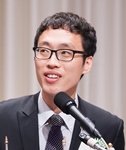Yoneyama Month Regular Meeting
��My Experience of Studying in Japan - Former Yoneyama Scholar aiming to start a business ��
October 7, 2015
Dr. Dong Wooseok
Vice President, Rotary 2610 District Yoneyama Alumni
Former Yoneyama Scholar 2012-14
�� I studied at Japan Advanced Institute of Science and Technology (JAIST) in Ishikawa Prefecture as a Yoneyama scholar and received my PhD last December.I registered my company DreamPharos at Kanazawa, Ishikawa, on October 1st and set out on a new path. I feel honored to make my table speech today as a Yoneyama alumnus at Tokyo Rotary Club, the very birthplace of the Yoneyama scholarship scheme.
I studied at Japan Advanced Institute of Science and Technology (JAIST) in Ishikawa Prefecture as a Yoneyama scholar and received my PhD last December.I registered my company DreamPharos at Kanazawa, Ishikawa, on October 1st and set out on a new path. I feel honored to make my table speech today as a Yoneyama alumnus at Tokyo Rotary Club, the very birthplace of the Yoneyama scholarship scheme.
��After graduating from a university in South Korea, I started my Master��s program at JAIST in April 2009, majoring in software engineering with a focus on educational support system development. I changed my major to knowledge science for my doctoral course and conducted research on an innovative model to utilize information technology for education services. I aimed to launch a venture and got an award from the University Venture Grand Prix for my ��Yume-chou (Dream notebook)�� service.
��I must say I had no knowledge or interest in Japan until I met my mentor in 2007 during my junior year at university who encouraged me to study in Japan if I wanted to start my own business. As you know, large companies like Samsung and LG are the main actors in the Korean economy, leaving little room for SMEs and ventures to grow. We also adore US in many respects, including their big, fast and cool products. The majority of our hardware (facilities and equipment) are American-style, however interestingly enough, our software (organizational structure, human resource management, customer services etc.) take a Japanese-style. I learnt that Korean companies developed by following the software and process of Japanese companies, which had achieved rapid economic growth from the 1960s to 1980s. I can say the present Korean companies combine the American hardware and Japanese software with Korean characteristics blended. Money can buy hardware equipment but you have to acquire and master software, mentality and experience by yourself. I decided to study in Japan to better understand the corporate culture and business practices of Korean companies.
��I was also motivated to study in Japan by taking a course on ��knowledge management�� advocated by a world-famous management scholar Professor Ikujiro Nonaka. Many big companies, including Samsung, propelled business innovation under the slogan of ��knowledge management�� back then. Management courses I had taken before then focused on ��how to maximize revenue (output) by allocating human and material resources (input) and optimizing the process.�� Professor Nonaka established a new management philosophy that goes beyond this concept, suggesting that ��we can achieve innovation and value creation by utilizing human knowledge.�� I was deeply impressed by his thoughts. I also came to understand the management philosophy of Mr. Konosuke Matsushita, the founder of Panasonic (a consumer electronics company) by reading his book The Path and was fascinated by the spirit of good service. I started to study Japanese and decided to study at JAIST founded by Professor Nonaka.
��I had long wished to become an entrepreneur. I feel so privileged to have been selected as a Yoneyama scholar because I was blessed with opportunities to talk with Rotarians about business management and receive their wise advice. I suffer from a chronic disease and have to pay for my medical bills. This financial burden almost made me give up my PhD studies and go back to Korea. So I was overjoyed to be selected a Yoneyama scholar, which enabled me to obtain my PhD, to study in the US, to win the business plan contest and finally to start my own business. I also met so many distinguished students from various countries through the Yoneyama program who all motivated me. Yoneyama scholarship is like a gift from god and I am deeply grateful.
��I love children, because I believe they are ��our future and our dream.�� I conducted surveys at kindergartens and nurseries and discovered teachers were overwhelmed by manual labor. At a kindergarten with 320 children, for example, teachers received over 120 paper-based correspondence cards from parents and had to check and write back to each one of them. I was requested to develop a system to facilitate these tasks and started to work on the ��Yume-chou�� service. This is an interactive communication service for kindergartens and nurseries, based on cloud computing technology that supports real-time communication between parents and staff of these facilities through personal computers, smartphones and tablet terminals. Parents feel relieved to share up-dated information on their children and to communicate with teachers. Kindergartens and nurseries can also save on costs because there is no need for printing or copying. I plan to provide additional useful services to share data and facilitate business alliances among kindergartens, local communities and other childcare businesses. We currently have a contract with Saibi Kindergarten in Kanazawa City, and several requests from kindergartens and local communities to introduce ��Yume-chou�� service.
��Thanks to the warm-hearted support from Rotarians and many people I have met in Japan, I could pursue my studies in spite of my incurable disease and overcome various hardships to start my own business. I am determined to commit myself to support children and let me ask for your continuous support and understanding.